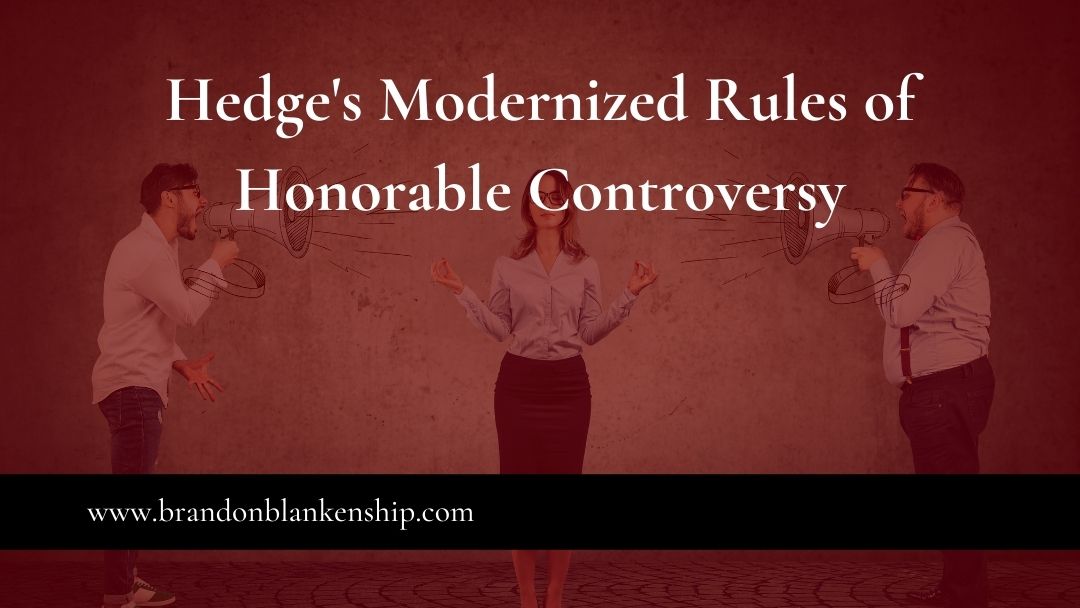arrogant /ˈerəɡənt/ having an exaggerated sense of one’s own importance or ability
controversy /ˈkäntrəˌvərsē/ disagreement
debate /dəˈbāt/ argue about a subject
honorable /ˈänərəb(ə)l/ bringing or worth high respect and great esteem
proof /pro͞of/ evidence or argument establishing or helping to establish a fact or the truth of a statement
Rule 1st:
Agree on the subject in controversy and the definitions of the terms used during the debate.
There should never be any misunderstanding about the subject in controversy. If misunderstanding arises, the debate will likely be less respectful and take a much longer time to resolve – this is because both parties will be on different pages, thinking they are on the same page.1
Rule 2nd:
Each party should assume that the other parties in the debate stand on equal footing with respect to the subject in controversy. Assume that all parties possess equal talents, knowledge, and desire for truth and that it is possible, therefore, that each party, even themselves, may be in the wrong, and their adversaries in the right.
In the heat of controversy, people often forget how often they have been wrong in the past. Consider that there have been major developments in almost every subject that revealed that long-held beliefs were error. Holding onto those beliefs results in presumptions, confidence, and arrogant language; all of which obstruct the discovery of truth.
Rule 3rd:
All expressions not directly related to the subject in controversy should be strictly avoided
Debate one subject in controversy at a time. Expressions that contribute nothing to the proof or the question; or jump from one subject to another; or impassioned expressions are other subjects not directly related to the subject in controversy.
Rule 4th:
Avoid commenting on the personal character of an adversary.
Good people can do bad and bad people can do good. Personal character comments are not only useless with respect to the subject in controversy but can produce real evil… They indicate in the person who uses them a mind hostile to the truth; for they prevent even solid arguments from receiving the attention to which they are justly entitled.
Rule 5th:
No one has a right to accuse their adversary of hidden motives.
Arguments are to be answered, whether the person who offers them is sincere or not; especially as their insincerity, if real, could not be ascertained. To inquire into their motives, then, is useless. To accuse them of indirect motives is … wounding.
Rule 6th:
The results of any debate are not to be awarded to the person who maintains it unless they expressly own them.
If an absurd consequence is fairly deductible from any proof, it is rightly concluded that the proof itself is false; but it is not rightly concluded that the person who advances it, supports the absurd consequence. The charitable presumption, in such a case, would be that the person had never made the deduction. Assume that if the opponent had considered this result they would not have argued for it in the first place.2
Rule 7th:
As truth, and not victory, is the professed object of controversy, whatever proofs may be advanced, on either side, should be examined with fairness and candor; and any attempt to ensnare an adversary with false proofs, or to lessen the force of his reasoning, by wit, petty or unnecessary objections, or ridicule, is a violation of the rules of honorable controversy.
Neighbor, can we live with these rules?
I was originally introduced to these rules by Prof. Gerald Jones. The original (below) was discovered in the Encyclopedia of English Grammar: Designed For the Use of Schools, Academies and Private Learners by William Hall and printed by Scott & Bascom, Columbus, OH (1850).
Hedge acknowledged that because human knowledge is limited and that known and newly discovered knowledge may be “contemplated by different minds” through “different points if view” controversy is a tool to test knowledge. The risk of controversy is that it is “oftentimes conducted with such intemperate and misguided zeal, as to inflame animosities, by which the comfort and harmony of society are impaired.” Hedge’s 1850 writing is just as relevant today.
I would join Mr. Hedge in the position, however, that even with those societal risks, the value of properly conducted controversy is immeasurably good. I would lift it to another level — it is a national moral that makes the United States great. The structure of a three-branch government, yes. Sovereignty divided between the federal and state governments, yes. Powers reserved to the citizenry, yes. But the resulting tension resolved through controversy, civil discourse, it is a national moral.
It is a beautiful thing to encounter modern students, often classically educated, who can take a position and deploy rhetoric and authority to artfully, and honorably, defend it. The student and the observer benefits from the encounter.
It is an ugly thing to encounter disruption disguised as controversy. It is evil to deploy those same rhetorical skills to dehumanize or reduce people. It is evil to twist authority to win for the sole sake of victory rather than what is right or good. So, “it is incumbent on all who engage in [controversy], from whatever motives, to observe rigorously those laws and principles by which [evil] may be avoided and [good] secured. The following rules, sometimes called canons of controversy, have been highly approved by writers of learning and discernment:”3
Hedge’s Rules of Honorable Controversy (Original)
- The terms, in which the question in debate is expressed, and the precise point at issue, should be so clearly defined, that there could be no misunderstanding respecting them.
If this is not done, the dispute is liable to be, in a great degree, verbal. Arguments will be misapplied, and the controversy protracted, because the parties engaged in it have different apprehensions of the question.
- The parties should mutually consider each other, as standing on a footing of equality in respect to the subject in debate. Each should regard the other as possessing equal talents, knowledge, and desire for truth, with himself; and that it is possible, therefore, that he may be in the wrong, and his adversary in the right.
In the heat of controversy, men are apt to forget the numberless sources of error, which exist in every controverted subject, especially of theology and metaphysics. Hence arise presumptions, confidence, and arrogant language; all which obstruct the discovery of truth.
- All expressions, which are unmeaning, or without effect in regard to the subject in debate, should be strictly avoided.
All expressions may be considered as unmeaning, which contribute nothing to the proof or the question; such as desultory remarks and declamatory expressions…
- Personal reflections on an adversary should in no instance be indulged….
Personal reflections are not only destitute of effect, in respect to the question in discussion, but they are productive of real evil… They indicate in him, who uses them, a mind hostile to the truth; for they prevent even solid arguments from receiving the attention to which they are justly entitled.
- No one has aright to accuse his adversary of indirect motive.
Arguments are to be answered, whether he, who offers them, be sincere or not; especially as his want of sincerity, if real, could not be ascertained. To inquire into his motives, then, is useless. To ascribe indirect ones to him is … hurtful.
- The consequences of any doctrine are not to be charged on him who maintains it, unless he expressly avows them.
If an absurd consequence be fairly deductible from any doctrine, it is rightly concluded that the doctrine itself is false; but it is not rightly concluded that he who advances it, supports the absurd consequence. The charitable presumption, in such a case, would be, that he had never made the deduction; and that, if he had made it, he would have abandoned the original doctrine.
- As truth, and not victory, is the professed object of controversy, whatever proofs may be advanced, on either side, should be examined with fairness and candor; and any attempt to ensnare an adversary by the arts of sophistry, or to lessen the force of his reasoning, by wit, caviling, or ridicule, is a violation of the rules of honorable controversy.
Brethren, can we live with the rules?
- Inviting Human Flourishing Through Building Design - March 22, 2024
- The Message in Your Misfortunes - January 28, 2024
- The Right of Self-Determination - January 15, 2024

